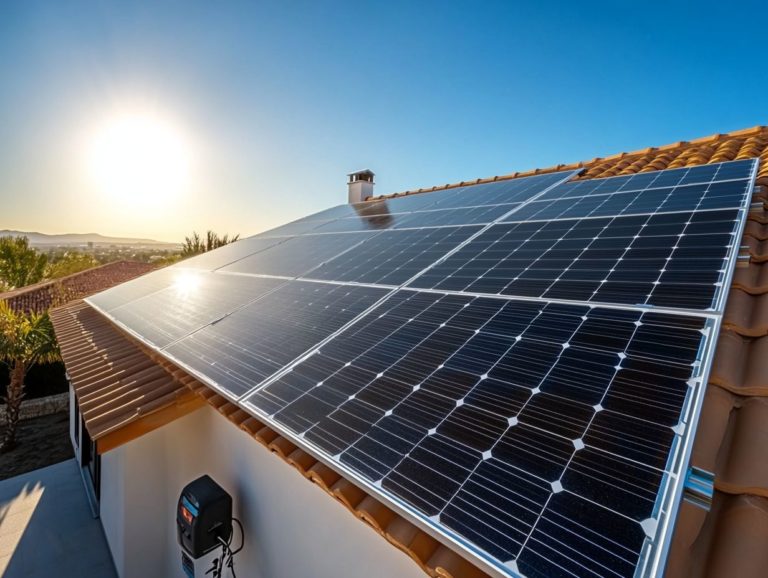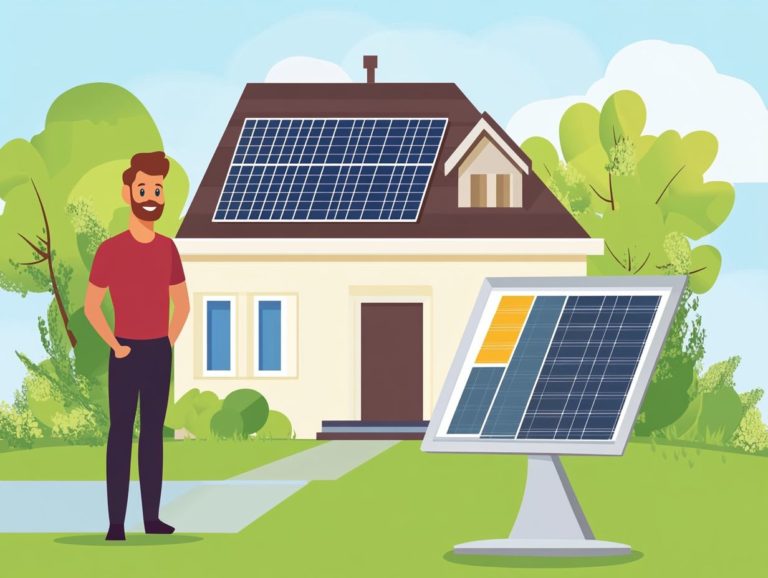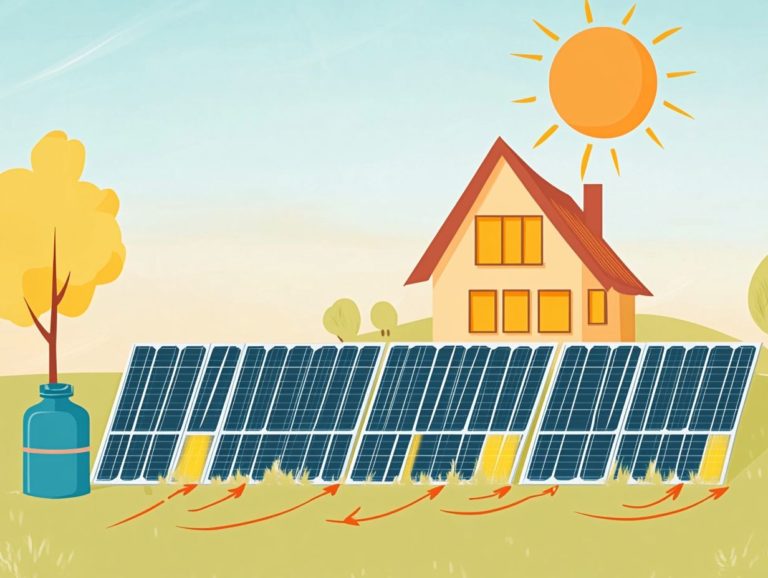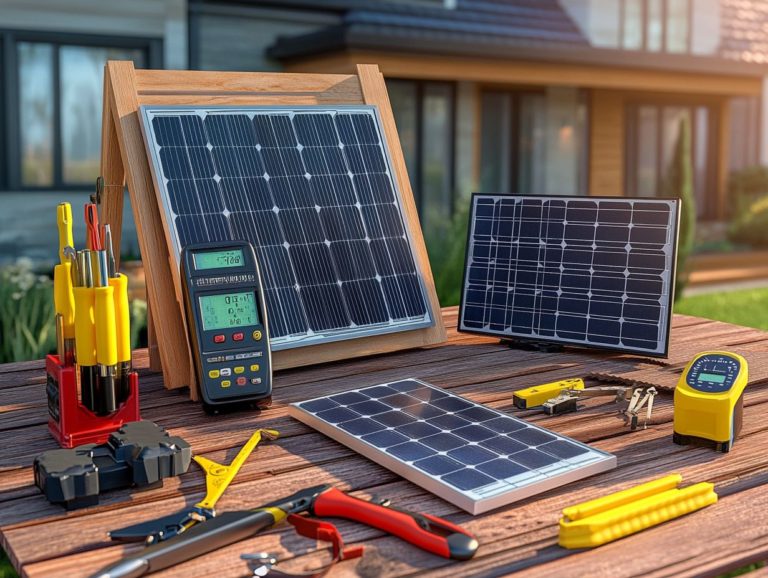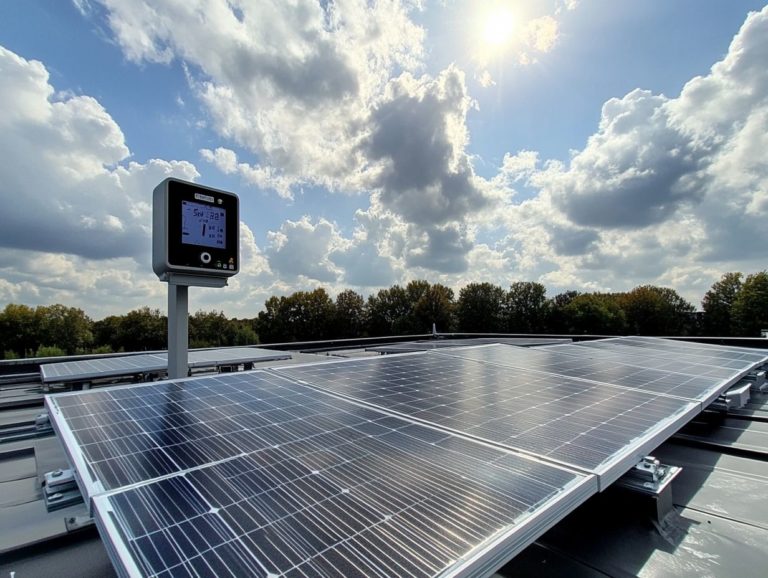“How Solar Energy Impacts Your Electricity Bill”
Solar energy is not merely a trend; it s an exciting solution for a sustainable future that you can embrace.
This article delves into the essentials of solar energy, guiding you through how solar panels function and the various systems available. You ll uncover the environmental advantages and cost savings that come with adopting solar energy. Additionally, you ll see how it can dramatically influence your electricity bill through net metering and energy credits.
This article clears up common misconceptions and highlights key factors to consider before making the transition. If you have questions about installation costs or the myths surrounding solar energy, this article equips you with the knowledge you need to enhance your understanding of energy.
Contents
- Key Takeaways:
- Solar Energy Basics
- Benefits of Solar Energy
- How Solar Energy Affects Your Electricity Bill
- Factors to Consider Before Installing Solar Panels
- Common Myths About Solar Energy
- Frequently Asked Questions
- How does using solar energy impact my electricity bill?
- Do I still have to pay for electricity if I have solar panels?
- Can solar energy completely eliminate my electricity bill?
- How long does it take for solar energy to impact my electricity bill?
- Are there any costs associated with using solar energy?
- Will my electricity bill increase if I use solar energy?
Key Takeaways:
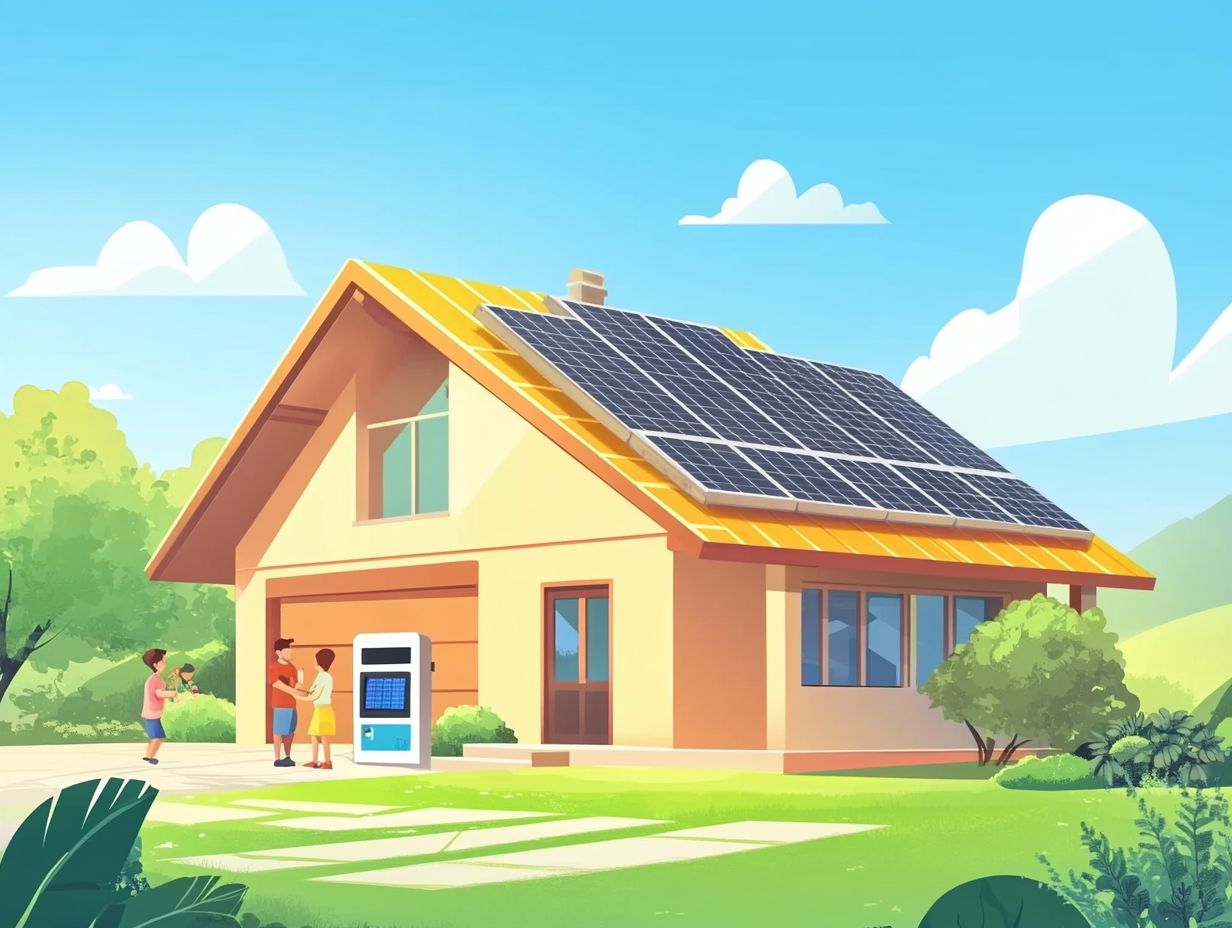
- Solar energy can significantly reduce your electricity bill through net metering and energy credits, as well as long-term cost savings.
- Installing solar panels not only benefits the environment but also provides a good return on investment.
- Before deciding on solar, consider factors such as cost, availability, and suitability for your home. Don’t believe common myths; do your research and make an informed decision.
Solar Energy Basics
More people are turning to solar energy as a clean power source, harnessed through solar panels and special cells that turn sunlight into energy. This sustainable solution not only addresses rising energy prices but also significantly reduces carbon emissions.
For UK households, embracing solar energy enhances energy performance while aligning with global renewable energy goals in 2023.
How Solar Panels Work
Solar panels convert sunlight into electricity, saving you money and reducing your reliance on traditional energy sources.
These special cells, typically crafted from silicon, capture sunlight’s energy through a semiconductor process, generating direct current (DC) electricity. An inverter then converts this current into alternating current (AC), making it ready for your household appliances.
By incorporating solar panels into your home, you can see a noticeable reduction in your monthly electricity bills while gaining a sense of energy independence that shields you from unpredictable energy price swings.
As more individuals embrace this technology, the collective impact contributes to a cleaner environment, significantly lowering carbon footprints and fostering a sustainable energy future.
Types of Solar Energy Systems
There are various solar energy systems available, each designed to meet your specific energy needs and budget considerations, including grid-tied and off-grid options.
Grid-tied systems have gained popularity for their seamless connection to the electricity grid, allowing you to draw power on cloudy days and even sell any surplus energy back to the utility company.
Conversely, off-grid systems grant you complete independence from the grid, perfect for remote locations. However, be prepared for a higher initial investment and ongoing maintenance.
If flexibility and security are what you’re after, hybrid systems blend the best of both worlds. Each design helps reduce energy bills while supporting a sustainable lifestyle.
Understanding installation costs and local incentives enables you to make informed decisions that align with your unique circumstances.
Benefits of Solar Energy
The advantages of solar energy extend beyond generating electricity; they encompass substantial energy savings, environmental benefits, and support for renewable energy objectives that resonate with UK households.
- By decreasing your reliance on conventional electricity sources, solar power significantly contributes to the reduction of carbon emissions.
- Embracing solar energy aligns your choices with a more sustainable future.
Start your solar journey today!
Environmental Impact
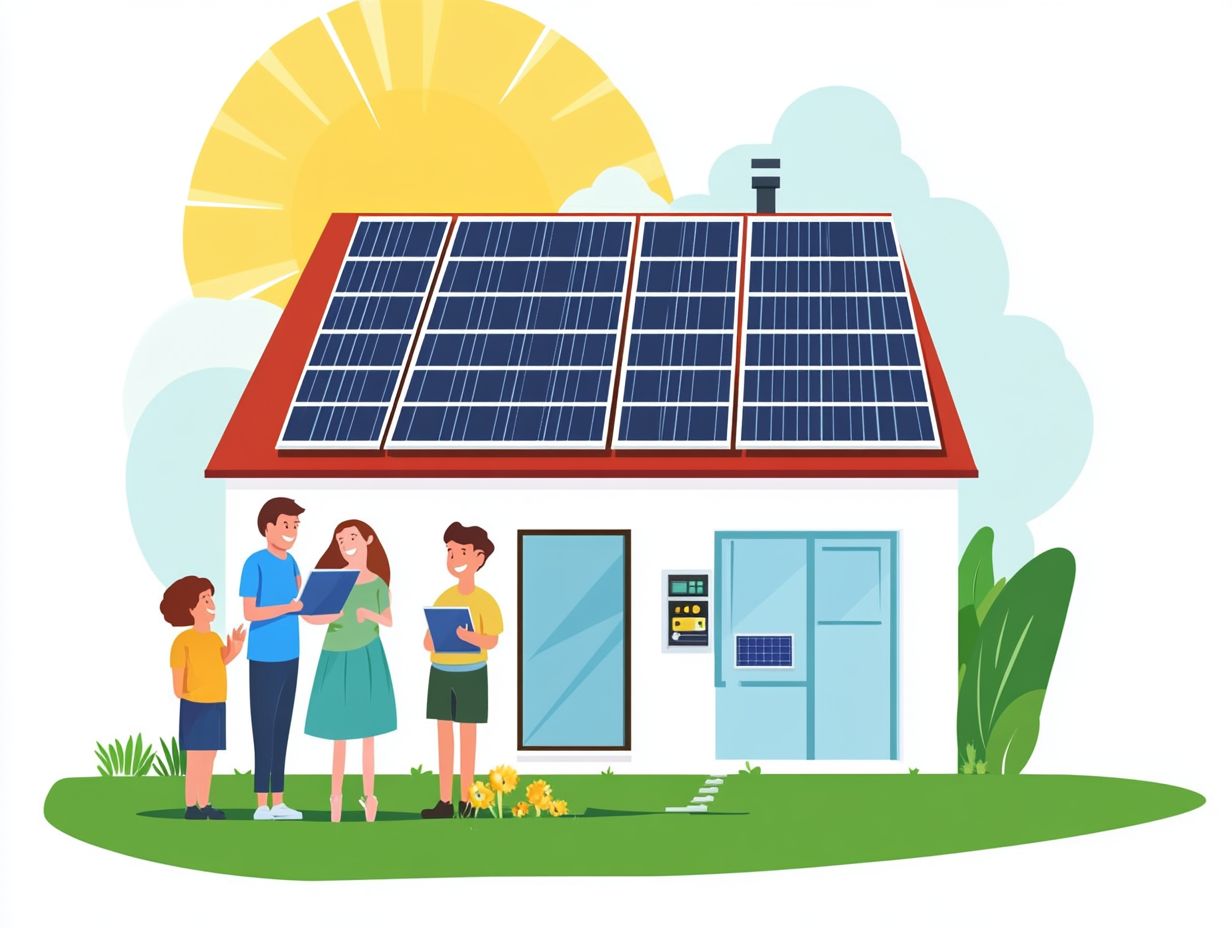
The environmental impact of solar energy is remarkably positive. It plays a crucial role in reducing carbon emissions and contributes to a cleaner, more sustainable planet.
By harnessing the sun’s power, you can help your community transition away from fossil fuels, which are major contributors to global warming. For instance, a study conducted in California revealed that large-scale solar installations can eliminate millions of tons of carbon dioxide emissions each year.
Solar energy projects also benefit local ecosystems. They create habitats for wildlife and promote biodiversity. This dual advantage allows you and your community to lower your carbon footprint while fostering a healthier environment.
Unlock Huge Savings with Solar Energy!
Investing in solar energy opens the door to big savings on your electricity bills, especially as energy prices keep climbing. For homeowners, solar panels are becoming increasingly attractive.
By installing a solar system, you reduce your dependence on traditional energy sources. This leads to a gradual decrease in your monthly expenses.
Although the initial installation costs may seem intimidating, various government incentives and rebates, like the Smart Export Guarantee, can help offset these expenses. This program lets you earn money by exporting surplus energy back to the grid.
With rising electricity prices, you can secure long-term savings while contributing to a more sustainable future. Don t miss out on the savings you could enjoy!
How Solar Energy Affects Your Electricity Bill
Solar energy profoundly impacts your electricity bill by decreasing your reliance on grid electricity. This enables homeowners like you to enjoy significant energy savings, especially when you take advantage of net metering.
Net Metering and Energy Credits
Net metering is a system that lets you earn credits for any excess electricity you generate. This makes a notable difference in your electricity bills.
Through this initiative, you can feed surplus energy back into the grid. This effectively spins your electric meter backward, leading to reduced monthly costs.
In the UK, policymakers are working to refine net metering schemes, aiming to facilitate a more sustainable energy transition while enabling individuals like you.
By converting surplus power into credits, you can enjoy tangible financial benefits. Your energy consumption charges decrease, and you receive compensation for your contributions to renewable energy.
This approach promotes energy independence and cultivates a greener community, aligning your economic interests with environmental stewardship.
Factors that Influence Savings
- Installation costs
- Government incentives
- Your energy consumption patterns
- Your geographical location
Several factors will influence the savings you generate from solar energy. Understanding how these elements interact is vital, as they can significantly affect your overall financial benefits.
For example, the size of the solar system you choose to install will determine how much energy you can harness, impacting your potential savings on electricity bills directly. Additionally, local energy prices are crucial; living in an area with higher utility rates may lead to a quicker return on your investment.
Government incentives, like tax credits or rebates, can further enhance the affordability of solar installations. This makes it easier for you to transition to renewable energy while maximizing your financial gains.
Factors to Consider Before Installing Solar Panels
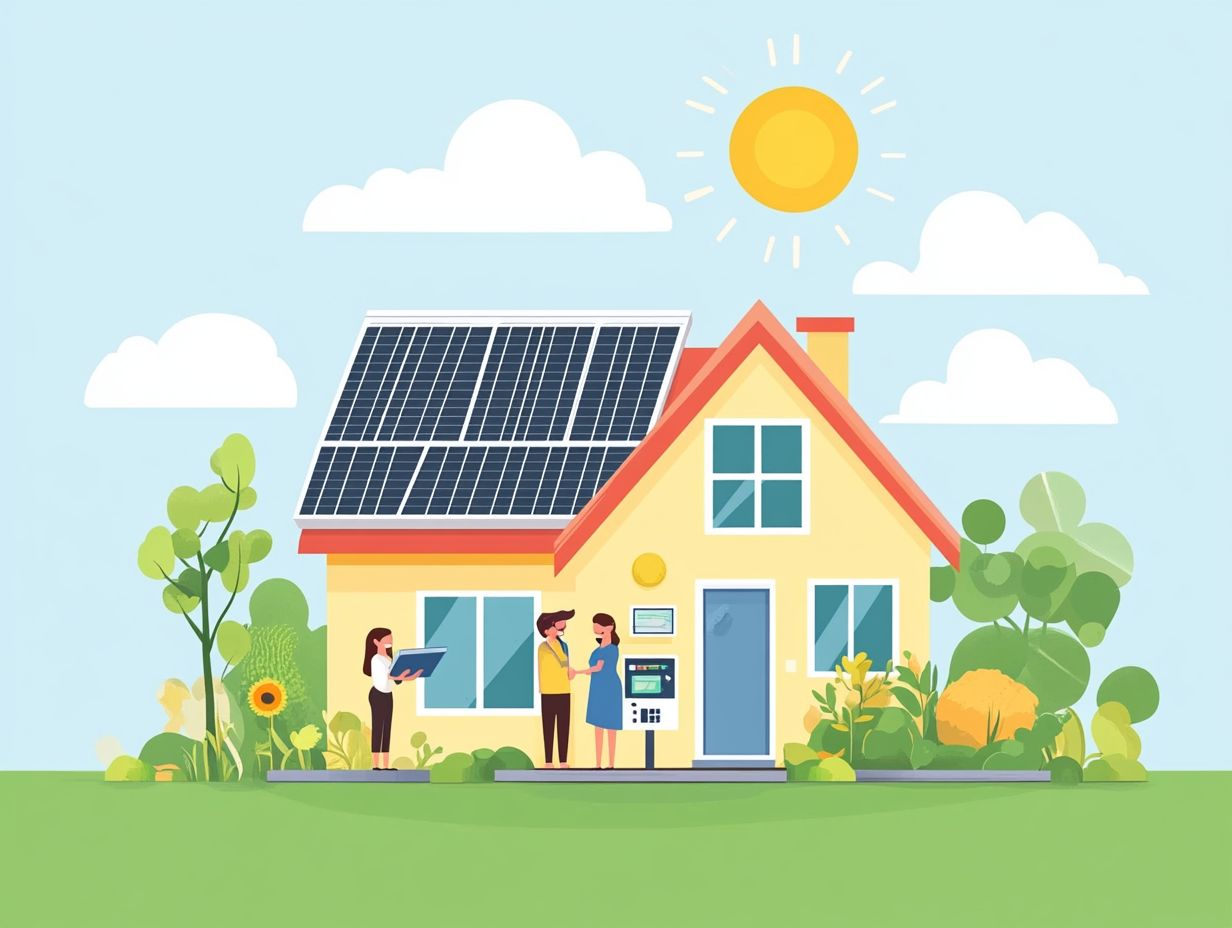
Before you install solar panels, consider some key factors:
- Installation costs
- Upfront expenses
- Maintenance requirements
- Suitability of your property for solar energy systems
Taking these into account will help you make a well-informed decision that maximizes the benefits of going solar.
Key Takeaway: Explore your solar options today and start saving!
Cost and Return on Investment
Understanding the costs and returns of investing in solar panels is vital for homeowners looking to maximize energy savings and financial benefits. Examining financial metrics such as the time it takes to recover your investment and potential savings can greatly influence your decision-making.
The payback period refers to how long it takes for your investment in solar panels to pay for itself through savings on your electricity bills. Several factors influence this, including initial installation costs, local utility rates, and any tax credits or incentives available.
Consider your energy consumption patterns. The more energy you use, the greater your potential savings, which directly impacts your overall return on investment. Evaluate these factors carefully to make informed decisions that align with your financial needs.
Availability and Suitability
Assessing whether solar panels are available and suitable for your home is crucial. Factors like roof orientation, shading, and local regulations significantly impact the success of the installation.
Your geographical location matters; areas with more sunlight generally produce better energy output. The characteristics of your property, such as roof size and material, also affect the feasibility of solar panel installation.
Don t overlook local government policies, which may include incentives or rebates that enhance the cost-effectiveness of solar energy solutions. By evaluating these aspects thoroughly, you can make a well-informed decision that meets your energy needs and financial goals.
Common Myths About Solar Energy
Many myths and misconceptions surrounding solar energy can hold you back from embracing this transformative technology, despite the numerous benefits and advancements it offers.
Let s clear up these myths to unlock the full benefits of solar energy!
Debunking Misconceptions
Debunking misconceptions about solar energy is vital for homeowners to grasp the true value and feasibility of solar installations. This includes understanding the impact of federal solar tax credits and upfront costs.
Many people assume that the initial investment in solar panels is too high, overshadowing the potential long-term savings on energy bills. However, federal solar tax credits can significantly reduce these upfront costs, making the switch to renewable energy much more manageable.
This financial incentive eases the burden of initial costs and enhances the overall financial outlook for anyone considering solar adoption. By understanding the realities around these credits and dispelling common myths, you can make informed decisions that align with your sustainability goals while enjoying economic benefits.
Frequently Asked Questions
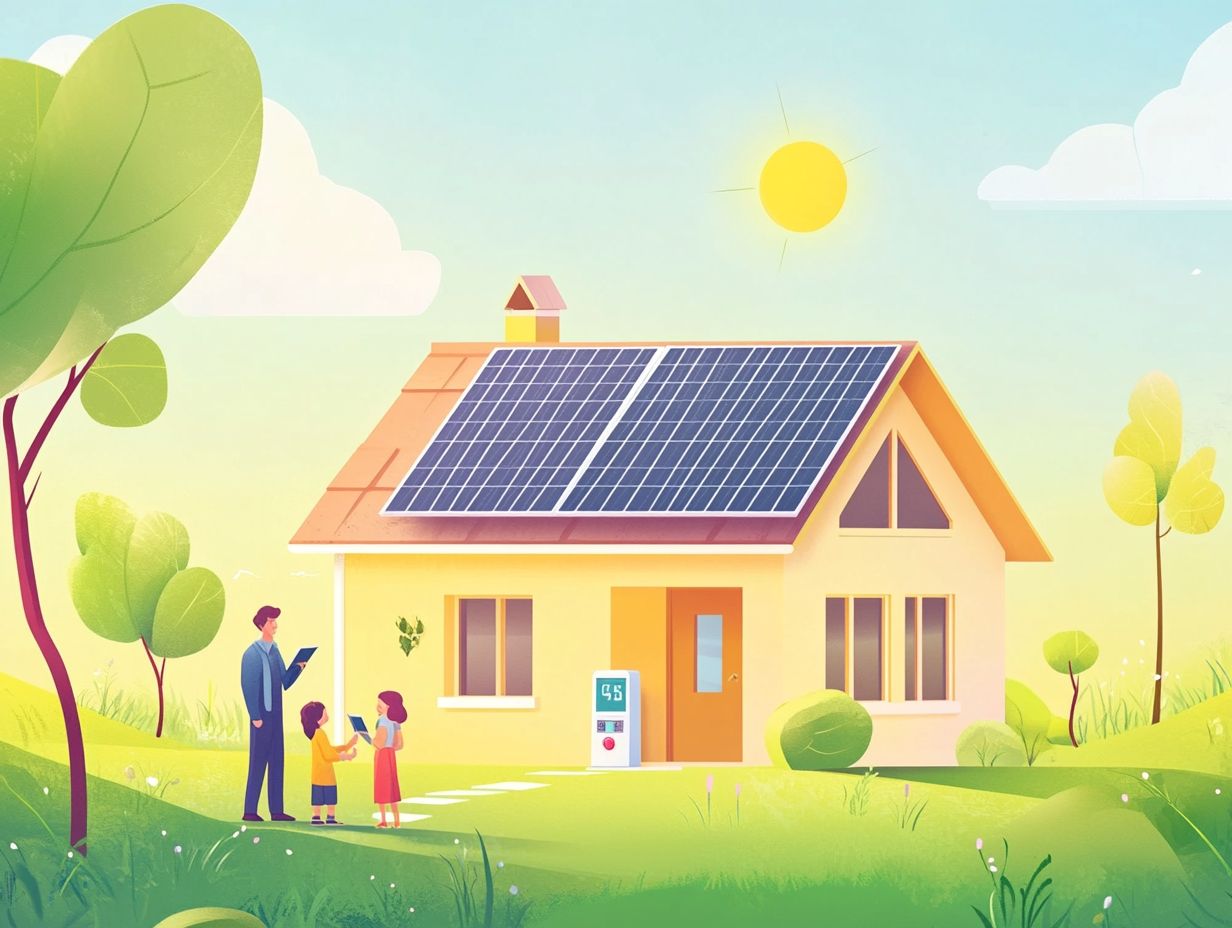
How does using solar energy impact my electricity bill?
Solar energy can greatly reduce your electricity bill by generating free and renewable energy. Since you’re producing your own energy, you ll rely less on traditional energy sources, leading to a significant decrease in your monthly electricity costs.
Do I still have to pay for electricity if I have solar panels?
Yes, you may still need to pay for electricity with solar panels. However, the amount will be significantly lower because you ll use less electricity from traditional sources. In some cases, you might even sell excess energy back to the grid, further reducing your bill.
Can solar energy completely eliminate my electricity bill?
Yes, it s possible to completely eliminate your electricity bill using solar energy. Your success will depend on factors such as the size of your solar system, your energy usage, and the amount of sunlight in your area. With the right system and conditions, you can generate enough energy to cover all your electricity needs.
Ready to explore solar options? Let’s get started!
How long does it take for solar energy to impact my electricity bill?
Your electricity bill will change based on factors like the size of your solar system, your energy use, and your location.
Most people see savings within the first month of installing solar panels. As you rely less on traditional energy, those savings will grow over time.
Are there any costs associated with using solar energy?
While solar energy can significantly cut your electricity bill, there are some upfront costs for putting up and maintaining the solar panels.
These costs are small compared to the long-term savings you’ll enjoy. Many governments also offer incentives and tax credits to help lower your initial investment.
Will my electricity bill increase if I use solar energy?
No, your bill shouldn’t go up with solar energy. In fact, it may go down since you’ll produce your own energy and rely less on traditional sources.
Remember, there may still be some fees from your utility company, but these will be much lower than before.


